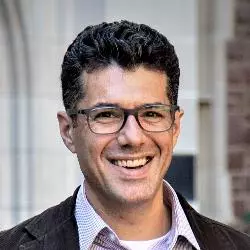
Jeffrey Zacks
Jeffrey M. Zacks is Professor and Associate Chair of Psychological & Brain Sciences, and Professor of Radiology, at Washington University in St. Louis. He received his BA from Yale University and his PhD from Stanford University in 1999. His research has been funded by the Defense Advanced Research Projects Agency, the National Science Foundation, the National Institutes of Health, the Office of Naval Research, and the James S. McDonnell Foundation. He has served as Associate Editor of the journals Cognition, Cognitive Research: Principles & Implications, and Collabra, Chair of the Board of Scientific Affairs of the American Psychological Association, and Chair of the governing board of the Psychonomic Society. He is the recipient of scientific awards from the National Science Foundation, Psychonomic Society, American Psychological Association and the American Psychological Foundation, and is a fellow of the American Association for the Advancement of Science, the Association for Psychological Science, the American Psychological Association, the Midwest Psychological Association, and the Society of Experimental Psychologists. Zacks is the author of three books, Flicker: Your Brain on Movies, Event Cognition (with G.A. Radvansky), and Ten Lectures on the Representation of Events in Language, Perception, Memory, and Action Control, and co-editor of Understanding Events (with Thomas F. Shipley) and Representations in Mind and World: Essays Inspired by Barbara Tversky (with Holly A. Taylor). He has published more than 90 journal articles and also has written for Salon, Aeon, and The New York Times.
Professor Zacks’ laboratory studies how the representations in the brain and the world work together in cognition. He studies perception and cognition using behavioral experiments, functional MRI, computational modeling, and testing of neurological patients. One line of research examines how people parse the continuous stream of behavior into meaningful events, and how this affects memory and cognition. Another line examines how mental imagery contributes to reasoning about spatial relations, especially how mental representations of one’s body are updated during imagery and reasoning.
EDUCATION
1988-1992 B.A. in Cognitive Science, Yale University, New Haven, Connecticut(magna cum laude, with the Intensive Major in Psychology).
1994-1996 M.A. in Cognitive Psychology, Stanford University, Stanford, California
1996-1999 Ph.D. in Cognitive Psychology, Stanford University, Stanford, California Dissertation: Event structure perception: Studies in perceiving, remembering, and communicating. Committee: Barbara Tversky (chair), Gordon H. Bower, Herbert H. Clark, and John D. E. Gabrieli.
ACADEMIC POSITIONS
1991 Visiting fellow with the Los Alamos Speech Recognition Project. Los Alamos National Laboratory, Los Alamos, New Mexico
1992-1994 Staff scientist in the Cognitive Science Research Group. Bell Communications Research (Bellcore), Morristown, New Jersey
1995 Complex Systems Summer School. Santa Fe Institute, SantaFe, New Mexico
1995-1996 Research Associate, Interval Research, Incorporated. Palo Alto, California
1999-2006 Assistant Professor, Department of Psychology. Washington University, St. Louis, Missouri
2004-2006 Assistant Professor, Department of Radiology. Washington University, St. Louis, Missouri
2006-2012 Associate Professor, Departments of Psychology and Radiology. Washington University, St. Louis, Missouri
2007-2013 Visiting Professor. Northumbria University, Newcastle, England.
2010 Visiting Fellow, Center for Advanced Studies (Clare Hall). University of Cambridge, Cambridge England
2012-present Professor, Departments of Psychological & Brain Sciences and Radiology. Washington University, St. Louis, Missouri
2014-present Associate Chair, Department of Psychological & Brain Sciences. Washington University, St. Louis, Missouri
2018-present Affiliated Faculty, Program in Film and Media Studies, Washington University, St. Louis, Missouri
2018-present Faculty Fellow in Residence, Thomas. H. Eliot Residential College, Washington University, St. Louis, Missouri
HONORS AND AWARDS
1994-1997 National Science Foundation: Graduate Research Fellowship.
1998 American Psychological Foundation/Council of Graduate Depts. of Psychology: Graduate Research Scholarship in Psychology.
1998-1999 Stanford University: Humanities & Sciences Dissertation Fellowship.
2002-2006 Washington University: Recognition for excellence in graduate mentoring.
2004 American Psychological Association: Division of Experimental Psychology Young Investigator Award in Experimental Psychology: Applied.
2008 American Psychological Foundation: F.C. McGuigan Young Investigator Prize.
2020 Psychonomic Society: Mid-Career Award.
Fellow of the Society of Experimental Psychologists, AAAS,theAssociation for Psychological Science, the American Psychological Association (Division 3), the Psychonomic Society, the Society for the Cognitive Study of the Moving Image, and the Midwest Psychological Association
SELECTED PUBLICATIONS
Richmond, L. L., Sargent, J. Q., Flores, S., & Zacks, J. M. (in press). Age Differences in Spatial Memory for Mediated Environments. Psychology and Aging. Advance online publication. http://dx.doi.org/10.1037/pag0000286
Wahlheim, C. N., & Zacks, J. M. (2018). Memory guides the processing of event changes for older and younger adults. Journal of Experimental Psychology: General.
Kurby, C. A., & Zacks, J. M. (2018). Preserved neural event segmentation in healthy older adults. Psychology and aging, 33(2), 232.
Richmond, L. L., & Zacks, J. M. (2017). Constructing experience: Event models from perception to action. Trends in Cognitive Sciences, 21(12), 962–980.
https://doi.org/10.1016/j.tics.2017.08.005
Flores, S., Bailey, H. R., Eisenberg, M. L., & Zacks, J. M. (2017). Event segmentation improves event memory up to one month later. Journal of Experimental Psychology: Learning, Memory, and Cognition, 43(8), 1183.
No items yet!
No items yet!
